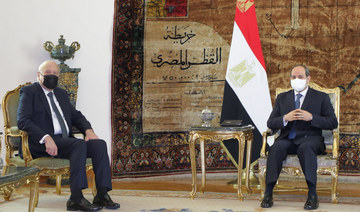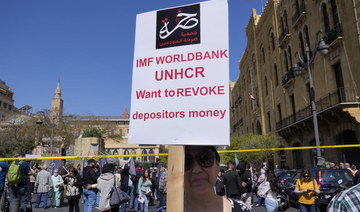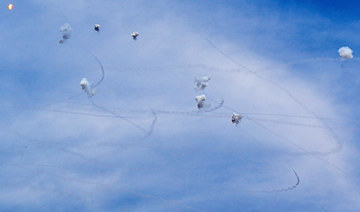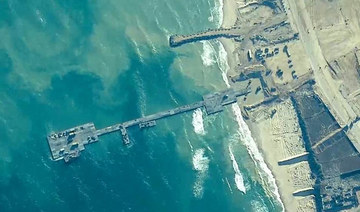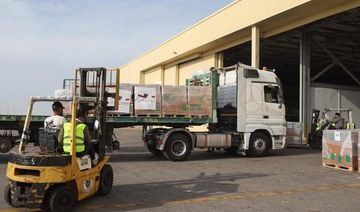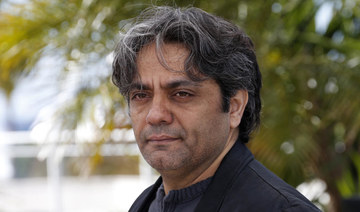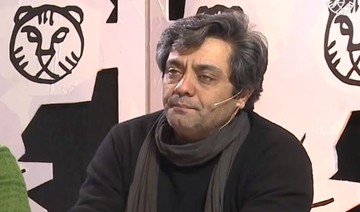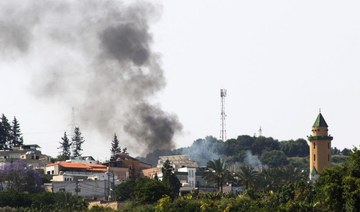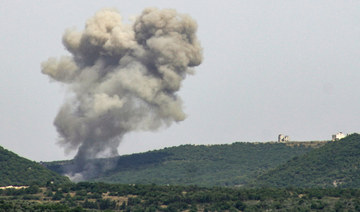TRIPOLI, Lebanon: Ziad Hilweh knew his family might die on the way. But the risk was worth it, he said, to reach the shores of Europe for a new start with his wife and three kids, away from the daily humiliation of life in Lebanon.
The country’s economic meltdown had destroyed him. The currency crash meant that the value of his salary from working at a private security company fell from $650 a month to about $50 after the Lebanese pound lost more than 90 percent of its value in less than two years. It reached the point the 22-year-old could no longer afford milk and diapers for his children.
But the young father’s hopes of a better future were shattered last month, when the boat they were on board headed to Italy broke down in the Mediterranean Sea, hours after they set off from the outskirts of Lebanon’s port city of Tripoli. Along with dozens of other would-be migrants on the boat, they were towed back to shore by the navy after a terrifying attempt at escaping.
For years, Lebanon has been a host for refugees, mainly from Syria, but now it is a departure point. Hundreds of Lebanese have tried to reach Europe this year on boats from their country’s shores, spurred by a devastating economic crisis that has thrown two thirds of the population into poverty since October 2019.
It is not a route on the scale of the main sea path from Turkey to Greece used by many refugees and migrants. But it is a startling shift as Lebanese join Iraqis, Afghans, Sudanese and other Middle Eastern nationalities in leaving their homelands.
Sea departures from Lebanon have increased starting in 2020, compared to previous years, said Lisa Abou Khaled, spokeswoman for the UN refugee agency. According to UNHCR figures, more than 1,570 people embarked or attempted to embark from Lebanon between January and November, most heading for Cyprus. The majority have been Syrians, but Abou Khaled said a notable number of Lebanese have joined them.
“It is evident that these are desperate journeys undertaken by people who see no way of survival in Lebanon,” said Abou Khaled.
The country is witnessing a frightening convergence of multiple crises, including political instability, the coronavirus pandemic and a massive explosion at the capital’s main port in August last year that have all added to the financial unraveling of the country.
Hilweh had been growing more desperate with each day. For months, he asked relatives and friends to help him financially. Chatting with friends one night, he heard that smugglers were taking people to Europe, and that some have already made it there.
He and a close friend, Bilal Moussa, decided to give it a try. Hilweh decided to take his wife and children, while Moussa planned to go alone and apply for family reunification once he settles in Europe.
They were told it would cost $4,000 for each adult and $2,000 for a child. Hilweh sold his apartment and his car and borrowed some from relatives. He was still short, but the smuggler gave him a discount and took the $10,000 Hilweh had, instead of $14,000.
“I am dead here and might die on the way. But if I reach the destination, I can live a decent life,” Moussa said.
The smuggler told them to meet at a location near Tripoli’s Abu Ali river shortly before midnight on Friday, Nov. 19, and that 70 people would be on the boat. At the location, they were put into a covered produce truck and driven to Qalamoun, just south of Tripoli.
There, at an abandoned resort, they boarded the wooden boat with their belongings. Around midnight, as they left shore, the smuggler began reading the names of people on board.
There were 92, instead of 70, including about two dozen Syrian and Palestinian refugees.
They quickly ran into trouble. A Lebanese navy ship approached the boat, ordering them through loudspeakers to turn back. The captain ignored their calls and kept moving west.
The navy ship circled them, causing waves that shook the boat and threw water inside. The shaking grew more violent as the ship drew closer, filling it with more water that pushed it down. The screaming passengers spread out around the boat to balance it and threw bags into the sea to keep it afloat.
Hilweh’s wife and children were sitting near the engine, and when the boat flooded with water, thick smoke poured out. His 3-month-old son Karim stopped breathing and almost suffocated, he said.
“He lived and died in front of me,” he said, recalling the panic before Karim was breathing again.
“I started reciting the shahada,” said Hilweh’s wife, Alaa Khodor, 22, referring to the profession of faith in Islam that Muslims recite when close to death.
Eventually, the boat stabilized, and they kept moving west while the navy chased them. Looking at a screen, the boat’s captain shouted that they had left Lebanon’s territorial waters. Immediately, the navy ship turned back.
“I felt very happy. I am out of Lebanon. I have crossed the line of humiliation,” Hilweh recounted. He celebrated by hugging his wife and two daughters, Rana, 3, and Jana, 2.
Their relief was short-lived. Shortly before sunrise, the water-logged engine gave out completely. Stalled in the darkness and silence, the frightened passengers frantically called relatives in Lebanon to tell the military they needed help.
Hours later, the Lebanese navy finally arrived and towed the boat back.
“Once the boat stopped, I felt everything go dark, I felt devastated,” Hilweh said. “When we arrived back I had tears in my eyes.”
Back in Tripoli, the men were separated from the women and children and questioned for hours. The smuggler is still in detention, Hilweh said.
Tripoli is Lebanon’s most impoverished city. Its mayor, Riad Yamak, said that last year, several people drowned off the coast of Tripoli while trying to reach Europe.
Last year, a boat taking migrants to Cyprus ran out of diesel and was stranded for eight days, during which at least six persons died. The UN peacekeeping forces in Lebanon, known as UNIFIL, rescued the rest and handed them over to Lebanese authorities after giving them first aid.
“This is suicide when someone takes his family by sea,” Yamak said.
Hilweh and his wife disagree. They have already lost their apartment, their car and Hilweh’s job. They said they will keep trying until they make it to Europe even if this means putting their lives and those of their kids in danger again.
“I will take any danger to get out of here. There is nothing here,” Khodor said.
‘I am dead here’: Lebanese join Mideast migrants to Europe
https://arab.news/9j8k4
‘I am dead here’: Lebanese join Mideast migrants to Europe
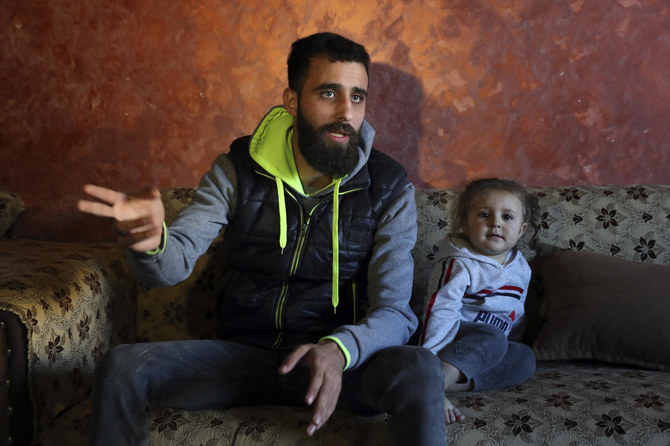
- For years, Lebanon has been a host for refugees, mainly from Syria, but now it is a departure point
Four Britons repatriated from Syria camp, Kurds say
The four had been interned in the Roj camp where militants’ relatives are held
QAMISHLI, Syria: Kurdish authorities in northeast Syria said Friday that they had handed over a woman and three children to British representatives for repatriation, with a source saying they had been held in a camp for militants’ relatives.
Five years after the Daesh group was driven out of its last bastion in Syria, tens of thousands of the militants’ family members, including from Western countries, remain in detention camps in the Kurdish-controlled northeast.
The Kurdish administration said it had “handed over a woman and three children to the United Kingdom,” following a meeting with a British delegation led its Syria envoy Ann Snow.
A source within the administration told AFP the four had been interned in the Roj camp where militants’ relatives are held.
Britain’s foreign ministry said UK officials had “facilitated the repatriation of a number of British nationals from Syria to the United Kingdom.”
“This repatriation is in line with the long-standing policy that all requests for UK consular assistance from Syria are considered on a case-by-case basis, taking into account all relevant circumstances including national security,” the spokesperson said.
On May 7, the United States announced it had brought back 11 Americans including five minors, as well as a nine-year-old non-US sibling of an American, from internment camps in northeastern Syria.
The United States in the same operation facilitated the repatriation of six Canadian citizens, four Dutch citizens and one Finnish citizen, eight of them children, Secretary of state Antony Blinken said.
And in December, the Kurdish administration handed over to Britain a woman and five children who had also been held in a camp.
Despite repeated appeals by the Kurdish authorities, a number of Western countries have refused to take back their citizens from the camps.
Among the most high profile cases is that of Shamima Begum, a former Briton stripped of her citizenship after leaving the country aged 15 to marry an Daesh group fighter.
Lebanon ‘open to any effort to curb Israeli aggression,’ says Berri
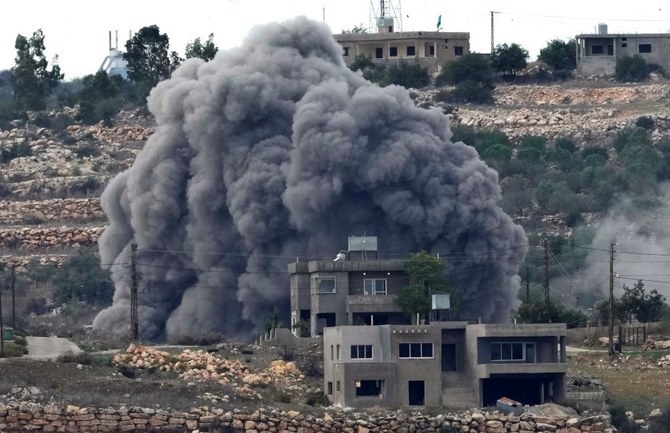
- Parliamentary speaker accuses Israel of ‘greed’ over Lebanese resources
- Berri’s statement came as hostilities between Hezbollah and the Israeli army in the southern border region entered their 230th day
BEIRUT: Lebanon is willing to cooperate with any international effort to stop Israeli aggression and bring security to the region, Parliamentary Speaker Nabih Berri said on Friday.
However, in a statement marking the 24th anniversary of Israel’s withdrawal from southern Lebanon in 2000, Berri warned that Lebanon “is not ready to waive any of its sovereign rights.”
He also accused Israel of displaying “greed toward Lebanon, its resources, its entity, and its land, sea, and air borders.”
Berri’s statement came as hostilities between Hezbollah and the Israeli army in the southern border region entered their 230th day.
The parliamentary speaker called for intensified international and regional efforts to halt Israel’s assault in the Gaza Strip, saying this was crucial to maintain security and stability in the entire region.
Hezbollah claims its actions have been in support of Gaza amid further Israeli threats to Lebanon.
Israeli Prime Minister Benjamin Netanyahu vowed on Thursday from the northern command headquarters “to carry out detailed, important and even surprising plans to return displaced settlers to the north.”
He claimed Israel had killed hundreds of Hezbollah fighters.
Benny Gantz, a minister in the Israeli war Cabinet, said: “Get ready from now on for the return of the residents of the north to their houses safely in early September by force or order.”
Berri returned from Tehran after attending the funeral of Iranian President Ebrahim Raisi, who was killed in a helicopter crash on May 19.
In his message to the Lebanese, he renewed Lebanon’s “commitment and adherence to UN Resolution 1701, and all its terms and stipulations.”
The resolution calls for an end to hostilities between Israel and Hezbollah, the withdrawal of Israeli forces from Lebanon to be replaced by Lebanese and UNIFIL forces in southern Lebanon, and the disarmament of armed groups including Hezbollah.
Berri accused Israel of ignoring the resolution “since the moment it was issued, with over 30,000 land, sea and air violations.”
Lebanon “upholds its right to defend its land with all the available means in the face of Israeli hostilities,” he said.
He called for the liberation of “the remaining occupied territory in the Kfarchouba Hills, the occupied Shebaa Farms, the northern part of the GHajjar village, and the contested border points with occupied Palestine all the way to the B1 point in Ras Al-Naqoura.”
Caretaker Minister of Defense Maurice Slim said that Lebanon preferred peace to war.
However, “defending the land was and will be the Lebanese state’s choice through the resilience of its army and people, especially the steadfast ones who are still residing in their villages and towns to repel the aggression,” he said.
Israeli warplanes on Thursday struck the town of Maroun Al-Ras in the Bint Jbeil district.
Sirens sounded in Israeli settlements opposite the border with Lebanon amid fears of possible drone attacks.
The Israeli newspaper Yedioth Ahronoth reported on Friday that Hezbollah’s drones caused significant damage in the northern towns and resulted in several fatalities.
Another newspaper, Israel Hayom, said that Hezbollah’s drones are “one of the biggest threats facing Israel in the northern arena.”
The newspaper said that Hezbollah leader Mohammed Hassan Fares, who was killed by an Israeli drone strike last week in Qana, was a scientist who specialized in robotics and machine learning.
2,000 aid trucks stuck at Rafah border: Norwegian Refugee Council
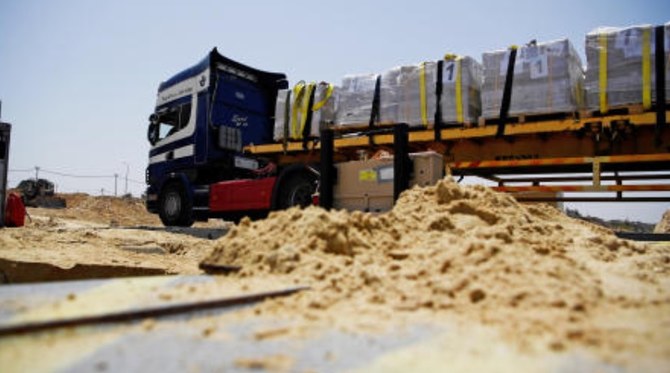
- Palestinians ‘actively deprived’ of essential items as Israel steps up operations in city
- Some in Gaza have been displaced as many as 9 times since October
LONDON: The Norwegian Refugee Council has warned that 2,000 aid trucks are stuck in Egypt at the Rafah border crossing, with Palestinians in Gaza being “actively deprived” of essential goods.
Rafah is the last remaining area of Gaza yet to come under full assault by Israeli forces, with fears now mounting of an imminent operation to take the southern city.
The NRC’s head of operations in Gaza, Suze van Meegen, told the BBC: “The city of Rafah is now comprised of three entirely different worlds: the east is an archetypal war zone, the middle is a ghost town, and the west is a congested mass of people living in deplorable conditions.”
She said medical supplies, tents, water tanks and food are being held up at the border, and in some cases Palestinians in Gaza have been displaced as many as nine times since Israel launched its military operation last October.
“People have no choice but to put their faith in so-called ‘humanitarian safe zones’ designated by the forces that have killed their family members and destroyed their homes,” she added.
Israeli journalist Amos Harel told the BBC that he believes Israel is moving ahead with plans to occupy Rafah with tacit US support.
“It’s quite clear that the Americans are no longer trying to prevent Israel from occupying Rafah. So the Israelis may proceed carefully and not too quickly. But it’s less of a question of whether the Israelis are going to occupy Rafah. It’s quite clear that they are,” he said.
It comes despite earlier warnings by US President Joe Biden against Israel attacking “population centers,” and with the International Court of Justice set to rule on the legality of the Israeli campaign in Gaza after a case was submitted by South Africa in December accusing Israel of genocide.
Escaped Iranian director receives ovations at Cannes

- He received raucous standing ovations before and after the gala screening of “The Seed of the Sacred Fig,” which is competing for the top prize Palme d’Or
- He attended the premiere on Friday alongside his daughter and Iranian actor Golshifteh Farahani, who lives in exile in France
CANNES, France: It is one of the most dramatic storylines ever delivered at Cannes: Iranian director Mohammad Rasoulof walked the red carpet Friday after fleeing a prison sentence in his home country just days before the film festival.
He received raucous standing ovations before and after the gala screening of “The Seed of the Sacred Fig,” which is competing for the top prize Palme d’Or.
“I hope the entire apparatus of oppression and dictatorship will disappear from Iran,” he told the packed Cannes theater, where he brandished photos of the movie’s actors.
Made underground in Iran on a tiny budget, it tells the story of a court prosecutor whose family life is torn apart by the “Women, Life, Freedom” protests that convulsed the country in 2022-23.
Friday was the last day of the Cannes Film Festival screenings, with the winners from the 22 entries to be announced on Saturday by a jury led by “Barbie” director Greta Gerwig.
Rasoulof came under pressure in Iran to withdraw his latest from the festival, but he already knew during the production that he faced a new eight-year prison sentence for “collusion against national security” and hatched a plan to escape the country.
He attended the premiere on Friday alongside his daughter and Iranian actor Golshifteh Farahani, who lives in exile in France.
Speaking after the premiere, Rasoulof said he was thinking of “everyone who allowed this film to be made — those who are here, and those who were prevented from coming.”
An outspoken critic of Iran’s rulers, Rasoulof had already served two prison terms over his uncompromising political films and had his passport revoked in 2017.
It took 28 days on the road, moving between border villages, to get out of the country, he told Deadline magazine.
“The good thing about going to prison in Iran is that you meet all kinds of youthful people who can help you in such conditions,” he told the magazine.
The final film to screen in the competition, later Friday, is “The Most Precious of Cargoes,” the first animated film to compete for the Palme d’Or since 2008’s “Waltz With Bashir.”
It is the tale of a twin thrown to safety from a death train transporting his Jewish parents to Auschwitz, from Michel Hazanavicius, director of the Oscar-winning “The Artist.”
The 77th edition of the world-famous festival has seen a lot of sex, gore and #MeToo-related issues.
A late frontrunner is “All We Imagine as Light,” which premiered Thursday.
The first Indian entry in 30 years, it is a poetic monsoon-set portrayal of two nurses who have migrated to Mumbai, described as a dreamlike five-star “triumph” by The Guardian.
“Emilia Perez,” an audacious musical about a Mexican narco boss having a sex change, has also been a favorite.
Demi Moore has emerged as a serious contender for the best actress award after rave reviews for her “fearless” performance in “The Substance,” an ultra-gory horror film about the pressures women face to maintain bodily perfection as they age.
There has been a lot of love for “Anora,” a raw and often-hilarious story about a New York erotic dancer who strikes gold with a wealthy client, only to face the wrath of his Russian oligarch parents.
Francis Ford Coppola’s ambitious fable “Megalopolis” has its admirers but proved sharply divisive, while Donald Trump biopic “The Apprentice” has drawn strong reviews as well as legal threats from the former US president.
Also on Friday, George Lucas arrived in town to accept an honorary Palme d’Or.
“It’s always great to be recognized,” said the “Star Wars” creator.
“Obviously we have a lot of fans and all that kind of stuff. But in terms of awards, I don’t make the kind of movies that win awards!“
Hezbollah barrages deal heavy damage in northern Israel
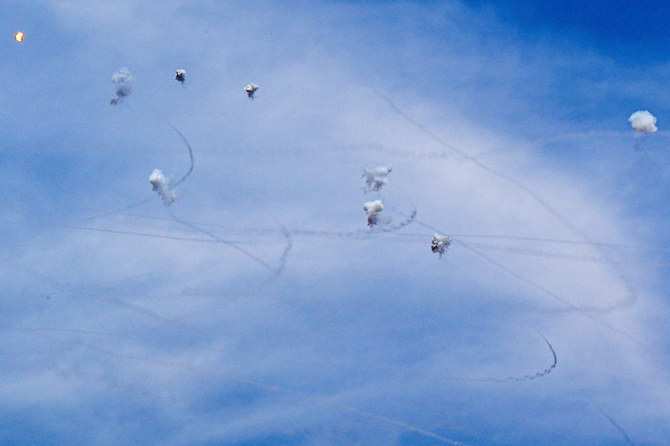
- The barrages have dealt a heavy blow to Israeli towns and villages near the border which have been evacuated for more than six months
- The Israeli defense ministry body responsible for rebuilding northern communities said it had received 930 reports of damage
SHTULA: A momentary shriek presages a bone-juddering blast, followed by a plume of thick black smoke. Refrigerator-sized holes mark where Hezbollah anti-tank missiles like this one have hit along Israel’s northern border.
Lebanese militant group Hezbollah has been exchanging near-daily cross-border fire with the Israeli army since Hamas’s unprecedented October 7 attack triggered war in Gaza.
The Iran-backed militants have launched thousands of rockets, mortar rounds, anti-tank missiles and attack drones at northern Israel.
The exchanges of fire have killed at least 11 civilians and 14 soldiers in Israel, according to the army.
At least 429 people have been killed in Lebanon, mostly militants but also including at least 82 civilians, according to an AFP tally.
The barrages have dealt a heavy blow to Israeli towns and villages near the border which have been evacuated for more than six months. They have also served as a warning of the far greater destruction that would be wrought by a full-blown war.
The Israeli defense ministry body responsible for rebuilding northern communities said it had received 930 reports of damage — around a third of them categorized as moderate to critical — the vast majority of it inflicted on residential buildings.
Hundreds more cases remain unassessed in towns like Arab Al-Aramsheh, Menara and Metula because it is considered too hazardous for inspectors to enter.
The report did not cite an estimated cost, but a senior defense official who spoke to AFP on condition of anonymity said reconstruction in the hardest hit locations could take months to a year.
In Kibbutz Menara, around 30 percent of buildings have suffered substantial damage, the official said.
At least 26 percent of the reported damage was caused by Israeli troops who have entrenched themselves in evacuated towns and villages along the 120-kilometer (75-mile) border, according to the Northern Horizon Directorate report.
The Israeli military said it “regrets any damage to the residents’ property” and is working to minimize damage as much as possible.
The most vulnerable communities were evacuated immediately after the outbreak of hostilities, displacing some 60,000 civilians. Access to them is restricted by the Israeli military.
But AFP reporters managed to visit Shtula, a village of 300 people sitting on the border that has 44 recorded cases of moderate to critical damage.
Although her neighbor’s house suffered a direct hit, and missiles pounded several other nearby buildings facing Lebanon, Ora Hatan, 60, is one of the few residents who has stayed on.
“An anti-tank missile flew over the chicken coop and right into the house,” said Hatan, pointing at a neighbor’s property.
“A direct hit. Fortunately, no one was home.”
Even after more than seven months of intense bombardment, Hatan won’t leave.
“It’s my house. It’s my land. It’s my country. Where would I go? Why should I go?” she told AFP on her balcony overlooking the Lebanese village of Raymeh two kilometers (little more than a mile) away.
As the war grinds on, and Hezbollah attacks show no sign of relenting, northern residents have grown weary of what many see as talk and little action.
For months, Defense Minister Yoav Gallant has said Israel will restore security — diplomatically or militarily. The two sides fought a devastating war in 2006.
Israel’s Channel 13 reported that National Security Adviser Tzachi Hanegbi told lawmakers Wednesday that “the cabinet hasn’t defined any clear objective concerning the north — not dates, not targets, not strategic aims.”
A poll published Thursday by Israel’s public broadcaster showed that 46 percent of respondents backed military action in Lebanon, while 29 percent opposed.
On Thursday, a few hundred activists set up a protest camp to demand urgent action to restore security and allow displaced residents to return to their homes in the north.
One of the organizers, Nisan Zeevi, lives in kibbutz Kfar Giladi and serves on its emergency response team.
Across the valley from his home, a fortified tower seven storys high looms over the kibbutzim in the valley below that have been frequent targets of drone and missile strikes.
A house in the neighboring kibbutz bears a gaping hole where a missile strike killed a woman and her son in January.
Zeevi said the camp aimed “to express our protest to the Israeli government and to the world until they find a solution to the severe security situation.”




